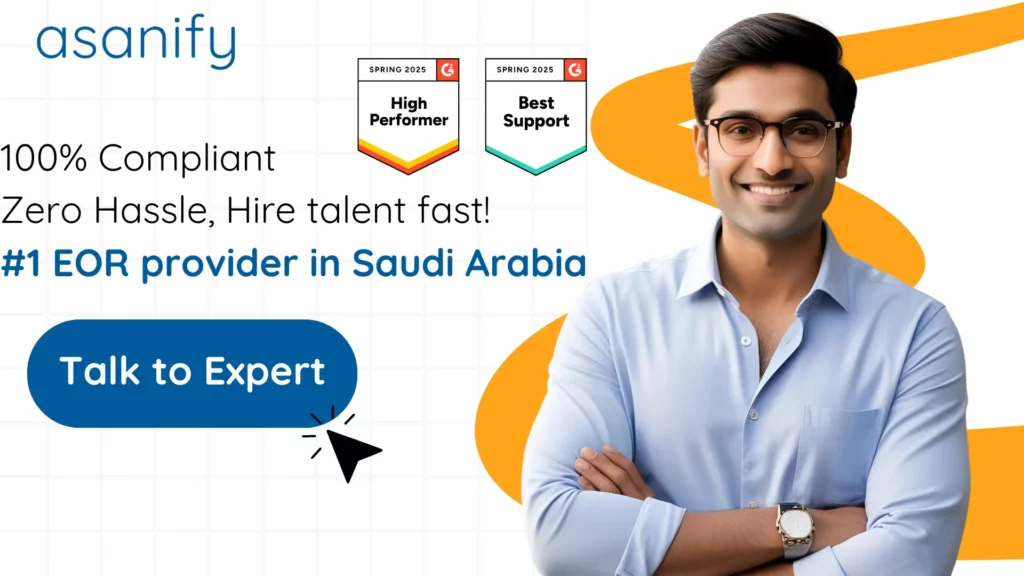Saudi Arabia is emerging as a strategic hub for global businesses, especially in fintech, energy, healthcare, and digital services. Vision 2030 reforms, a booming private sector, and cities like Riyadh, Jeddah, and Dammam make it an attractive market for remote talent. However, hiring in Saudi Arabia involves strict labor laws, visa regulations, Saudization (Nitaqat) quotas, and payroll compliance. To simplify remote onboarding, global companies rely on an Employer of Record (EOR) to manage legal hiring, sponsorship, payroll, and labor compliance. This Onboarding Checklist ensures a seamless and legally compliant process for integrating remote employees into your Saudi Arabian workforce.
Table of Contents
- Why Remote Employee Onboarding is Different in Saudi Arabia
- Pre-Onboarding Stage with EOR in Saudi Arabia
- Onboarding Stage with EOR in Saudi Arabia
- Post-Onboarding Compliance in Saudi Arabia
- Why Use an EOR for Remote Employee Onboarding in Saudi Arabia
- Asanify’s Role in Saudi Arabia Remote Onboarding
- Final Checklist for Saudi Arabia Remote Employee Onboarding
- Conclusion
- FAQs
Why Remote Employee Onboarding is Different in Saudi Arabia
Remote hiring in Saudi Arabia involves navigating Arabic employment contracts, GOSI registration, Saudization requirements, and stringent residency permit (Iqama) processes. The onboarding process must comply with Saudi Labor Law, overseen by the Ministry of Human Resources and Social Development (MHRSD).
Key onboarding considerations include:
- Arabic labor contracts compliant with Saudi Labor Law
- GOSI (General Organization for Social Insurance) registration
- Iqama processing and medical tests
- Mandatory private health insurance
- Nitaqat compliance for nationalization quotas
An EOR partner simplifies this complexity, allowing companies to hire and onboard remote Saudi-based employees without a local entity.
Pre-Onboarding Stage with EOR in Saudi Arabia
- Candidate Verification and Background Check
The EOR validates academic and professional credentials, and conducts background checks as per Saudi immigration norms. - Finalizing Job Offer and Salary Package
Define gross salary, housing and transport allowances, bonuses, and benefits such as gratuity and leave entitlements. - Drafting MHRSD-Compliant Employment Contracts
The EOR prepares bilingual (Arabic-English) contracts, registers them with MHRSD or the relevant Free Zone authority, and ensures full compliance with Saudi Labor Law. - Defining Role and Performance Expectations
Clearly outline job duties, working hours (usually 48/week), probation period (up to 90 days), and KPIs before onboarding.

Onboarding Stage with EOR in Saudi Arabia
- Visa Sponsorship and Iqama Issuance
The EOR manages visa sponsorship, medical fitness tests, biometrics, Iqama application, and labor office registration. - Health Insurance Enrollment
The EOR arranges legally mandatory health insurance before issuing the Iqama. The EOR ensures timely enrollment. - Payroll Setup with GOSI Compliance
The EOR registers the employee with GOSI and sets up payroll, ensuring accurate calculation and payment of contributions. - Provisioning Equipment and IT Tools
The company arranges devices, secure login credentials, VPNs, and tools needed for productive remote work. - Employee Orientation and Welcome Kit
Conduct a virtual onboarding session introducing company culture, HR policies, remote work norms, and key team members.
Suggested Read: Pay Contractors in Saudi Arabia: The Ultimate Guide to Hiring
Post-Onboarding Compliance in Saudi Arabia
- Leave and End-of-Service Benefits
Saudi law mandates 21–30 days of paid annual leave and an end-of-service gratuity. The EOR tracks and manages these entitlements. - Iqama and Document Renewal Management
The EOR monitors expiration of Iqama, contracts, and insurance, ensuring timely renewals and legal compliance. - Employee Record-Keeping and Compliance
Maintain updated digital records of employment contracts, Iqama, salary slips, and HR documentation for audits and inspections. - Probation Review and Feedback Loop
The EOR facilitates structured performance reviews and manages contract updates or terminations post-probation if necessary.

Why Use an EOR for Remote Employee Onboarding in Saudi Arabia
Working with an EOR allows you to bypass administrative hurdles like:
- Setting up a legal entity in Saudi Arabia
- Navigating Nitaqat quotas and Saudization metrics
- Managing Iqama sponsorship and residency compliance
- Handling GOSI registration and payroll independently
An EOR provides legal, compliant onboarding with full visibility—freeing you to focus on team performance and business outcomes.
Asanify’s Role in Saudi Arabia Remote Onboarding
Asanify offers end-to-end EOR onboarding services across Saudi Arabia. We handle employment contracts in Arabic, Iqama sponsorship, medical insurance, GOSI registration, and payroll processing with full compliance.
With expertise in Saudi labor law and HR systems, Asanify provides:
- Drafting bilingual contracts and managing approvals
- Real-time updates on visa and Iqama processes
- WPS and GOSI-compliant payroll and taxation
- Transparent communication on onboarding progress
- Seamless scaling across Riyadh, Jeddah, and beyond
Final Checklist for Saudi Arabia Remote Employee Onboarding
This quick-reference checklist covers all essential steps for successfully onboarding remote employees in Saudi Arabia through an EOR. Each point ensures legal compliance, smooth operations, and a great new hire experience:
- Background verification completed
Candidate’s education, employment history, and legal records have been validated as per Saudi labor and immigration standards. - Job offer and salary package finalized
A clear offer letter with gross salary, allowances, and bonus structure has been approved and accepted. - MHRSD-compliant bilingual contract issued
Arabic-English employment contract has been drafted and submitted in accordance with Saudi Labor Law. - Visa and Iqama sponsorship initiated
The EOR has started the employee’s visa process, including medical tests and Iqama (residency permit) application. - Health insurance arranged before Iqama
Legally required medical insurance has been secured prior to issuing the employee’s residency documents. - GOSI payroll registration completed
The employee has been registered with the General Organization for Social Insurance (GOSI) for social security compliance. - Work devices and secure logins provisioned
Laptops, tools, VPN access, and credentials have been shared for remote work readiness from Day 1. - Virtual orientation conducted
The employee has been welcomed and introduced to the company culture, policies, and team via a virtual onboarding session. - Leave, benefits, and probation explained
HR has clearly outlined statutory leave, end-of-service gratuity, and probation evaluation timelines to the employee.

Conclusion
Saudi Arabia offers unparalleled growth opportunities for global employers, but remote onboarding requires careful legal navigation. With the right EOR partner, companies can ensure compliance with Saudi labor regulations while offering remote employees a structured, seamless onboarding experience.
From contract drafting to Iqama sponsorship and payroll processing, Asanify helps you onboard fast, stay compliant, and scale confidently in the Kingdom of Saudi Arabia.
Suggested Read: EOR Saudi Arabia: A Detailed Guide 2025
FAQs
Typically 10–20 business days, depending on Iqama and visa approvals.
No, EORs like Asanify enable you to hire without establishing a legal entity.
Yes, contracts must be in Arabic and filed with MHRSD.
The General Organization for Social Insurance handles employee social security. GOSI registration is mandatory for all employees.
Yes, the EOR acts as the legal sponsor for visa and Iqama issuance.
Yes, it is required before the Iqama is approved and must cover all medical needs.
Yes, leading EORs like Asanify operate in Riyadh, Jeddah, Dammam, and other major cities.
Allowances for housing, transportation, and bonuses are customizable based on your company’s policy.
The EOR handles performance review, permanent conversion, and necessary contract updates.
Yes, after completing one year of service, employees are legally entitled to an end-of-service gratuity.
Absolutely. EORs streamline the process, making rapid hiring and scaling feasible.
Not to be considered as tax, legal, financial or HR advice. Regulations change over time so please consult a lawyer, accountant or Labour Law expert for specific guidance.

